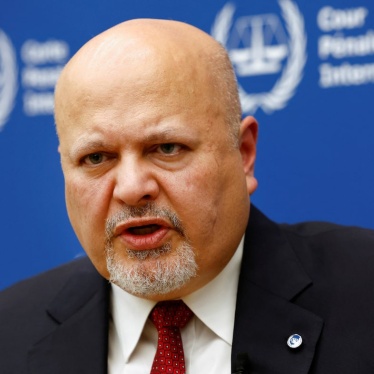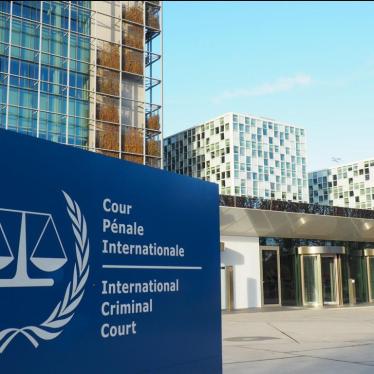(New York) - Eight Vietnamese writers are among a diverse group from 22 countries who have received the prestigious Hellman/Hammett award, which recognizes courage in the face of political persecution, Human Rights Watch announced today.
“This is an especially important year to recognize dissident writers in Vietnam,” said Sophie Richardson, deputy director of the Asia division at Human Rights Watch, which administers the annual award. “Vietnam’s emerging democracy movement has become bolder, more outspoken and public, making activists more vulnerable to government reprisals. The Hellman/Hammett awards give these writers international attention and some protection.”
Human Rights Watch administers the Hellman/Hammett awards, given to writers around the world who have been targets of political persecution. Among this year’s Vietnamese recipients are political prisoner Nguyen Vu Binh, democracy activist Do Nam Hai, essayist Nguyen Chinh Ket and novelist Tran Khai Thanh Thuy.
“These writers’ works and lives embody the Vietnam that the government wants to hide, the one in which there is free speech, independent media, and open access to and use of the internet,” said Richardson. “Those who think that Vietnam’s booming economy means it is loosening up politically should look below the surface, at the plight of writers such as these.”
Vietnam, well-known for its suppression of dissent, stepped up its crackdown on government critics in advance of the Asia Pacific Economic Cooperation (APEC) summit of world leaders, which was held in Hanoi in November.
The Vietnamese government made little attempt to hide its efforts to muzzle prominent critics or democracy activists, despite the mass of international journalists in Hanoi during APEC, Vietnam’s largest-ever international gathering. Key dissidents in Hanoi were placed under lock down. They were ordered not to leave their homes or have any visitors. Police were stationed in front of their homes, which were cordoned off with signs saying “Restricted Area” and “No Foreigners” to prevent any contact with the international press corps. One dissident had his door padlocked and was roughed up after a friend stopped by to visit.
In addition, police arrested at least eight members of a newly formed union, the United Workers and Peasants Organization of Vietnam. Independent trade unions are banned in Vietnam.
Authorities also rounded up rural petitioners in Mai Xuan Thuong Park in Hanoi, who had come to the city to file complaints about corruption and land confiscation. Along with street children and vagrants, they were sent to Dong Dau Social Protection Center, a detention facility on the outskirts of the city. Human Rights Watch has previously documented physical abuse and harsh conditions for detainees at Dong Dau. (See the November 2006 report, “Children of the Dust.”)
Such abuses are not limited to occasions when Vietnam is in the international spotlight. In addition to detaining or imprisoning individuals considered a political threat, the Vietnamese government uses other means to silence them. Dissidents’ telephones are disconnected, their internet connections are terminated, and they are questioned and often detained if they go to internet cafés. Their homes are periodically searched and their computers and documents confiscated. Their families are pressured to stop them from speaking out. They are insulted in articles in the official state media, or denounced by “angry citizens” in orchestrated public meetings. They are dismissed from their jobs, or find their client base has dried up as a result of official pressure and negative publicity. Even family members face intimidation and reprisals.
“By honoring these writers, we hope to bring international attention to courageous individuals that the Vietnamese government is trying to silence,” said Richardson. “The crackdown on dissidents was largely ignored by governments at the APEC summit, giving Vietnam the impression it has a green light to keep persecuting them.”
Short biographies of this year’s Hellman/Hammett awardees from Vietnam follow:
- Nguyen Vu Binh, 38, is serving a seven-year prison sentence, most of it in solitary confinement, for articles he wrote criticizing the government. One of the first members of Vietnam’s emerging democracy movement, Binh resigned in 2000 from his prestigious journalism post at the party’s Communist Review and tried to form an independent political party and an anti-corruption association. After submitting written testimony about human rights violations in Vietnam to the US Congress and circulating articles critical of the Vietnamese government on the internet in 2002, Binh was arrested and convicted on charges of “espionage” after an unfair trial.
- Do Nam Hai, 48, a banking professional, was one of the principal organizers of the April 2006 public petition campaign, “Manifesto on Freedom and Democracy for Vietnam” and the Democracy and Human Rights Alliance, a virtually unprecedented movement in recent years with broad geographical representation. Police have confiscated his laptop and mobile phone on numerous occasions. Since October 2006, authorities have subjected him to constant detention, interrogation and even physical attacks. He is followed day and night by security police. During the APEC summit in November, police seized him on the street to prevent him from participating in a news conference organized by the alliance. His most recent detention by the police was in late January 2006.
- Nguyen Chinh Ket, 54, is a Catholic from the north who moved to the south in 1954. He left the seminary in 1975, but remained active in the church. Since 2001, he has quietly become one of the leading Vietnamese activists, through his essays, freelance reports, and role in organizing meetings among dissidents. He is a leader in the Democracy and Human Rights Alliance, as well as founder of the Free Journalists Association in Vietnam, which groups independent reporters and bloggers. In November 2006, he was summoned by police for interrogation several times.
- Tran Khai Thanh Thuy is a novelist and journalist, and the only woman honored this year from Vietnam. An established author, she has written numerous novels and political essays. She is one of the editors of the dissident bulletin To Quoc (Fatherland), which is printed clandestinely in Hanoi, Hue, and Ho Chi Minh City, and is circulated on the internet. She has been repeatedly denounced and humiliated in public meetings organized by the authorities, including a “People’s Court” in October, where police gathered 300 people in a public stadium to insult her. Mobs have entered her home to call her a traitor and a prostitute and threatened to beat her. Police have told her they cannot protect her, and that the only way to do so is for her to abandon her activism. She and her husband have been harassed at their workplaces. In September and October 2006, she was continuously interrogated and detained by authorities, and in November she was dismissed from her job. She was locked in her house by authorities during the November 2006 APEC meetings.
- Nguyen Van Dai is one of Vietnam’s only practicing human rights lawyers, and a founder of the Committee for Human Rights in Vietnam, which was launched in 2006. He has taken on most of the legal defence for embattled Protestant churches, including the case of Mennonite pastor and former political prisoner Nguyen Hong Quang. He has written articles about democracy and press freedom, and was detained in August 2006, as he and other dissidents were planning to launch an independent bulletin. He was interrogated by police from November 9 to 14. Police were stationed in front of his home from November 15-22, during the APEC meetings. He was prohibited from leaving his home, and his cell phone and internet access were disconnected. In February 2007, security agents reportedly ransacked his house.
- Nguyen Khac Toan, 51, is an activist who was released from prison in February 2006. He remains under house arrest, and reports that there is a permanent police post in front of his home. A former soldier in the North Vietnamese army, Toan drew the government’s ire when he wrote a series of articles about demonstrations by farmers in 2001 and 2002 against land confiscation and corruption. He has helped farmers and military veterans draft appeals to the government, which, along with his own writings, have been disseminated on the internet. He was arrested in 2002 at an internet café and sentenced to 12 years on espionage charges. He was released after four years, in February 2006. Since his release, he has continued to campaign for democratic reforms, helping to launch an independent labor union and the Freedom and Democracy newsletter. In November 2006, he was summoned for interrogation by police. Undercover police were posted in front of his house to prevent foreigners from meeting him during the APEC meetings.
- Pham Que Duong, 75, is one of the most respected leaders of Vietnam’s democracy movement, and comes from within the Vietnamese Communist Party itself. A military historian, editor and writer, he is known for outspoken expression of his views – most notably, his resignation from the Vietnamese Communist Party in January 1999 to protest the expulsion of fellow government critic Tran Do. He has written many articles, appeals and open letters to Vietnam’s leadership, calling for democracy and human rights. He is one of the editors of the dissident bulletin To Quoc (Fatherland), which is printed clandestinely in Vietnam and circulated on the internet. He has been detained and placed under house arrest many times.
- Le Chi Quang, 36, is a young lawyer and democracy activist who was arrested at an internet café in 2002 and sentenced to four years in prison on national security charges. He was released early because of international pressure and health problems, including kidney disease. After his release in June 2004, he was put under three years’ house arrest. He is constantly harassed and interrogated by police at his home or at police stations. He cannot leave his quarter in Hanoi without police authorization. The authorities have put strong pressure on his family to force him to stop all dissident activities. The harassment has become harsher since he joined the editorial staff of the To Quoc bulletin, along with Pham Que Duong, Nguyen Thanh Giang, and Tran Khai Thanh Thuy.





